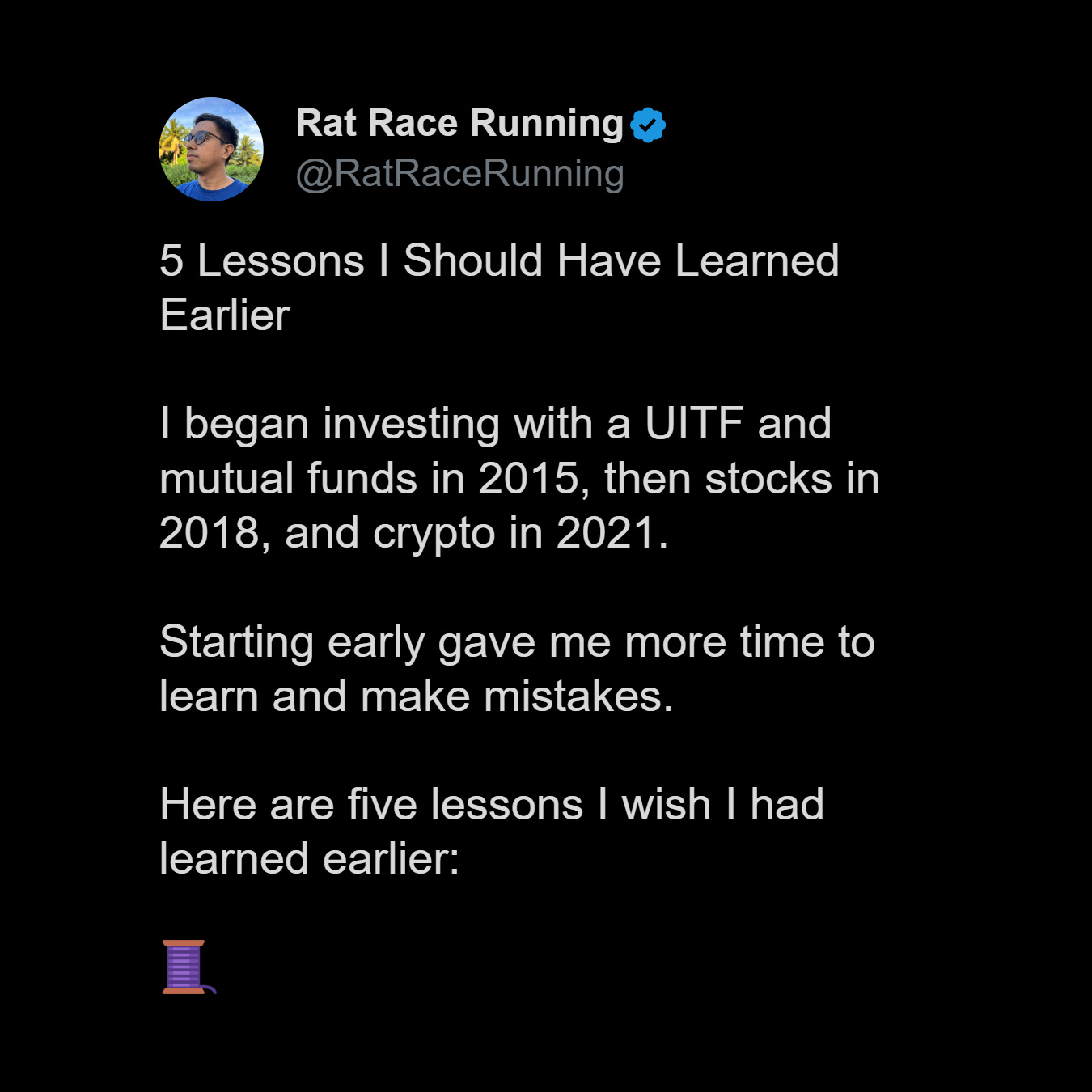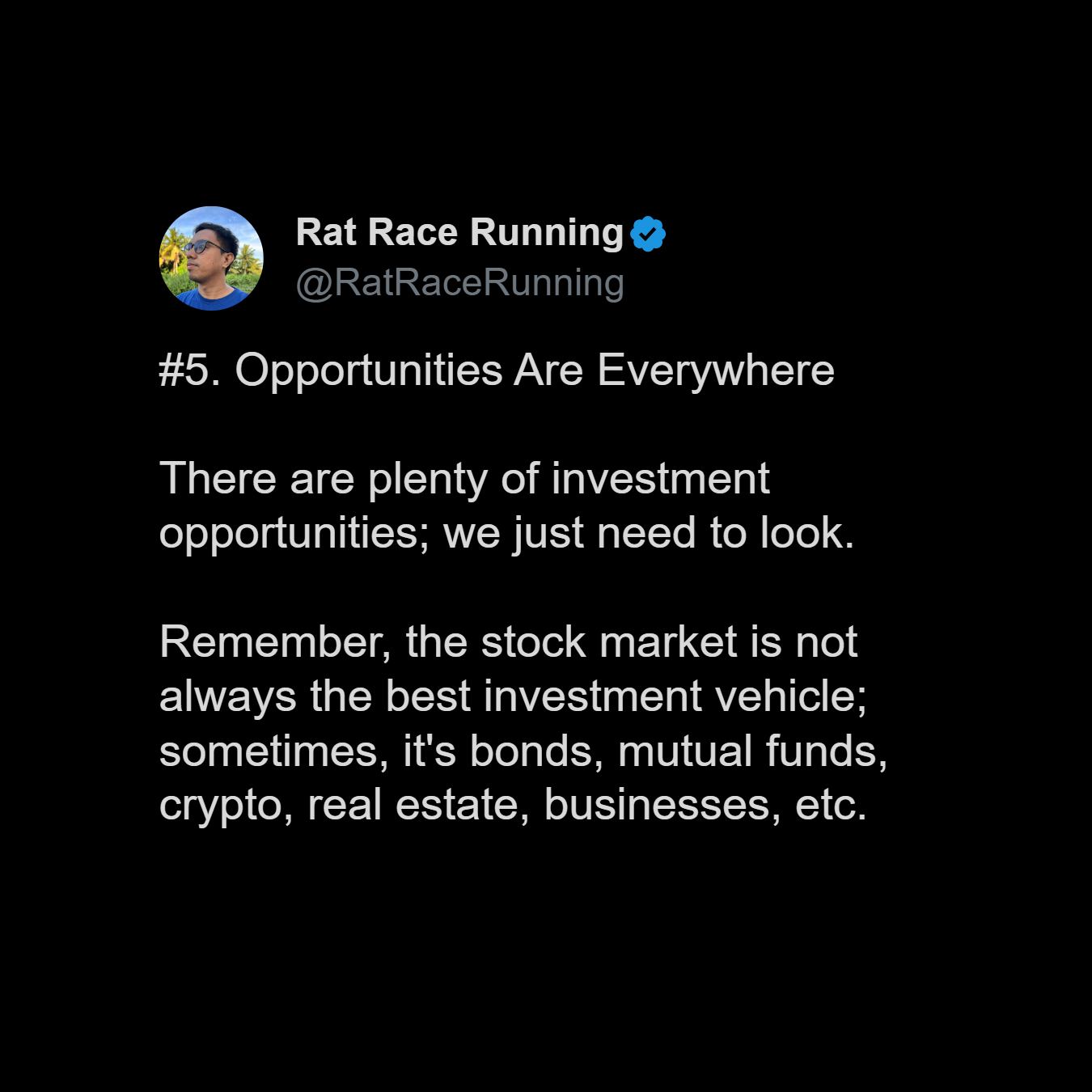#023: Being a Jack-of-all-Trades, Lowering Expectations, and RRR Updates
Read Time: 7 minutes
Speaking Time: 10 minutes

Here are the two better-performing articles for the week:
3 Reasons Why Being a Jack-of-all-Trades Is Not As Bad As People Think
3 Reasons Why We Should Learn to Always Lower Our Expectations.
You’ll also find:
Rat Race Running Update
RRR Thread of the Week - 5 Lessons I Should Have Learned Earlier About Investing
RRR Trade of the Week
RRR Investment Update for the Week
RRR Updates:
Facebook: The Rat Race Running Facebook Page has grown fast in the past 90 days, and we’re finally at 19,500 followers.
Looking back, the page took one year and two months to grow from 500 to 1,000 followers and around two years to reach 10,000, but it grew to almost 20,000 in the last 12 months.
Typeshare: My writing streak in Typeshare has reached 218 consecutive days, with over 88,000 words written. I am also currently #19 in the ranking, with the longest streak among ~76,000 writers on the platform.
Travel Journal: My wife and I have been traveling in Australia (Sydney and Newcastle, followed by Brisbane and Canberra). As a Filipino tourist, I can’t help but be amazed and envious of their efficient public transportation. Our friends simply explained it this way: zero tolerance against corruption.
Article #1 - 3 Reasons Why Being a Jack-of-all-Trades Is Not As Bad As People Think
Being a jack-of-all-trades often receives a bad name because they are masters of none.
However, I love completing the sentence with "Jack-of-all-trades master of none but oftentimes better than being master of one." It often boils down to individual strengths, weaknesses, and preferences. But it's also important to acknowledge that there are many advantages to being a jack-of-all-trades or a generalist.
So, if you're a jack-of-all-trades like me, then you may want to know its advantages.
#1. You Can Learn Concepts From Unrelated Fields.
Jack-of-all-trades loves learning about many things.
As generalists, jack-of-all-trades love to look at other perspectives and learn about many things, even if they seem unrelated. For instance, I love learning about writing, engineering, trading, education, psychology, economics, entrepreneurship, health, theology, and many more. I see them as part of my journey, and they have valuable applications.
For many jack-of-all-trades, learning is a reward in itself.
#2. You Can Be an Out-of-the-Box Thinker and Doer.
Being an out-of-the-box thinker is hard if you spend all your time inside the box.
So, for generalists who learned principles from different fields, looking at a bird's eye view and coming up with new solutions and applications becomes easier. Many jack-of-all-trades are also masters of integration, combining different disciplines into practical solutions.
Jack-of-all-trades can also be a master of many if they spend enough time and effort.
#3. You Can Adapt to the Changing Times Faster.
Many specialists spent years and decades mastering their one specialty.
Unfortunately, transitioning to a different field if needed is harder if you have already spent most of your life mastering one thing (due to sunk cost). Meanwhile, jack-of-all-trades love learning about new things, so adapting to change becomes easier.
Adaptability is one of the specialties of generalists.
Being a jack-of-all-trades is a compliment because the future belongs to generalists.
Article #2 - 3 Reasons Why We Should Learn to Always Lower Our Expectations.
Many people have high expectations and believe they only deserve the best out of life.
Unfortunately, this line of thinking often results in negative feelings when those unrealistic expectations are unmet. For instance, new college graduates pass the board exam and expect a salary of at least P50,000. What do you think will happen if all the companies they applied to can only offer P15,000?
Though it's good to have expectations, sometimes, it's important to be realistic and expect a little lower.
Here are three reasons why you should learn to lower your expectations.
#1. You Will Rarely Be Disappointed.
Unmet high expectations breed disappointments and even resentment.
I was an engineering student when I learned the importance of lowering my expectations. I realized that a grade of 3.0 is much better than a failed mark, which helped me navigate college better. However, after graduation, I became highly expectant again, resulting in disappointments in my 20s. I soon had to re-learn the art of lowering expectations.
Today, I maintain a healthy level of expectations about many things, especially from people, the government, and things beyond my control.
Please don't get me wrong; I still hope for the best, but I don't expect it to happen anytime soon, which made all the difference.
#2. Whatever You Receive Will Be a Pleasant Surprise.
If you have low expectations, anything that exceeds it becomes a pleasant surprise.
I remember the Parable of the Wedding Feast (Luke 14:7-14), where Jesus said that when going to a marriage feast, don't sit on the best seat and risk the shame of being displaced to a lower seat when someone more honorable arrives. Instead, sit in the lowest place, so when he who invited you can say, "Go up higher."
This parable talks about humility, which also applies to setting expectations.
It's a great life principle to expect lower and be surprised if something much better comes along.
#3. You Will Learn to Be Grateful.
When we expect lower but receive higher, it's impossible not to be grateful.
I remember someone applying for a staff-level position in a company, but during the interview, the hiring manager saw potential in her, so he offered a senior role instead. After it happened, she became grateful for the opportunity, the pleasant surprise, and the reward. This also applies to many things in life, where lowering expectations may open opportunities and blessings to be grateful.
I realized that if you set your expectations too high, you'll risk being disappointed.
Instead, set a healthy level of expectation depending on the situation and its importance for you.
RRR Thread of the Week:
Read the full thread here:
RRR Trade Idea Review of the Week
Disclaimer: This is strictly educational and is not a recommendation to buy or sell. I share both of my wins and losses to show new traders and investors the reality of the stock market.
Trade Idea Review: $URC
Last week’s trade idea with $URC materialized, with the stock rising to as much as P104. It’s a good 8 to 12% profit, but I like trading the range and locking in my profits rather than holding on to this one. Or you can sell half and trail the other half.
Last Week’s Trade Idea: $URC — this stock is among the PSE Dividend Yield (DivY) Index, which means it still pays a decent dividend to its investors. However, it has been sold lately. Similar to what I did the last time it went below P100, I’m looking to make a quick S/R trade for $URC.
The strategy is simple: Buy near support, sell at the immediate psychological resistance, and cut your losses if it goes below PHP 89.
RRR Investment Update
Dividend Update: We’re approaching the fourth quarter, so there may be some dividend announcements soon. I also bought my first tranche of another cheap dividend stock (non-REIT) and might buy a few more in the next few months.
Some of my REIT holdings are becoming too overpriced, so I might sell some to lock in profit. As I mentioned, I like “advancing” my dividends, so whenever there are newer opportunities, I profit from some.
I also like keeping around 15 to 25% of my assets in cash, so I still have the buying power to participate whenever there are opportunities for quick trades due to sudden sell-offs. I learned it from the past.
REIT Updates: $VREIT remains the only REIT over 10% with an annualized yield of 10.22%, followed by $DDMPR at 9.21%.
$FILRT and $MREIT are still both above the 7% annualized yield range, but I’d prefer MREIT to FILRT any time of the day.
The two energy REITs, $PREIT and $CREIT, have the same annualized yield, while the market favorite, $AREIT, remains to have the lowest yield.
DISCLAIMER: This is not a recommendation to buy, sell, or hold. I am only sharing this to show the difference between each REIT’s current dividend yield.
See you again next Monday at 8 AM Philippine Time — RRR
Did you enjoy this? Share it with a friend. ;)
Follow Me on Social Media:
Facebook - facebook.com/ratracerunning
Twitter/X - x.com/ratracerunning
Typeshare - typeshare.co/ratracerunning











